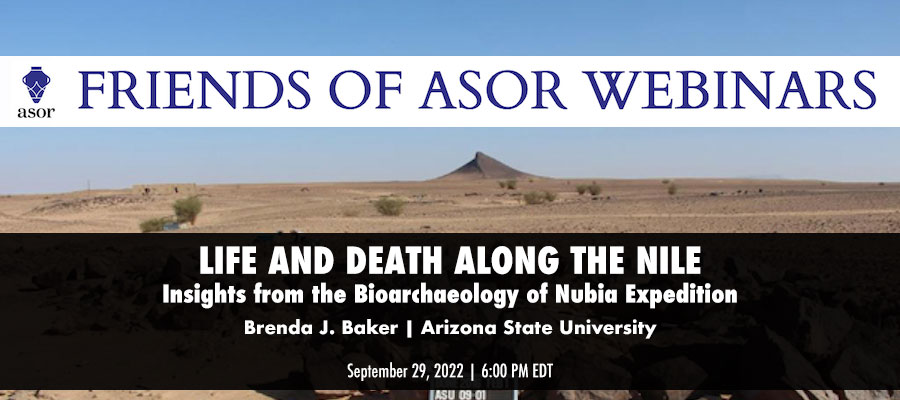Life and Death along the Nile: Insights from the Bioarchaeology of Nubia Expedition, lecture by Brenda J. Baker (Arizona State University), ASOR via Zoom, September 29, 2022, 6:00 PM EDT
Friends of ASOR present the next webinar in our monthly series on September 29, 2022, at 6:00 pm EDT, featuring Prof. Brenda J. Baker and moderated by Prof. Geoff Emberling.
The Bioarchaeology of Nubia Expedition (BONE) project area encompasses nearly 100 square meters on the north bank of the Nile River between the fourth and fifth cataracts in northern Sudan. More than 200 sites from the Earlier (more than 250,000 years ago) Stone Age through the Christian period (c. 550-1400 CE) have been documented. Sites include areas of habitation, rock art and gongs, a fort, and cemeteries. Excavated cemeteries consist of clusters of Kerma period graves (c. 2500-1500 BCE) and a large late Meroitic to Christian period cemetery (used c. 200-1400 CE) with burials of more than 100 individuals.
Recent research includes evaluation of evidence that graves were often re-entered within memory of a person’s death to retrieve heirlooms rather than looted without regard for the deceased. Inclusion of imported grave goods reveals integration into far-flung trade networks through time and biogeochemical analyses of tooth enamel show that people during the Kerma period were highly mobile. Spatial and social organization of cemeteries, and distinct characteristics marked during life (e.g., purposeful removal of teeth) or death (e.g., burial with particular items) illuminate aspects of ancient Nubian identity and mortuary behavior.
Join Dr. Baker as she examines the individuals buried in these cemeteries to reveal little known aspects of the lived experiences of the past people who inhabited this area of ancient Sudan. Please be aware that images of human remains will be shown during this lecture. The webinar will conclude with a live Q&A session moderated by Prof. Geoff Emberling (University of Michigan).
Brenda J. Baker is Associate Professor of Anthropology and Curator of Nubian Collections in the Center for Bioarchaeological Research, School of Human Evolution and Social Change, at Arizona State University. She is Director of the ASU Bioarchaeology of Nubia Expedition (BONE), conducting fieldwork in a project area west of Abu Hamed, Sudan. As a bioarchaeologist, her research integrates archaeology and biological anthropology to investigate the lifeways of past people, their funerary practices, and evidence of disease they experienced. She has worked extensively in the U.S. and at Abydos, Egypt. She is also the bioarchaeologist for Princeton University’s project in Polis, Cyprus, where she is analyzing remains of people who were interred in and around two Late Antique to medieval basilicas. Dr. Baker is a founding co-editor of Bioarchaeology International and serves on the advisory board of the American-Sudanese Archaeological Research Center (AmSARC). She is a co-organizer (with Geoff Emberling) of the ASOR/AmSARC workshop, “Reintegrating Africa in the Ancient World.”
Fees: ASOR Members: $6 | Public: $12
Advance registration required.
